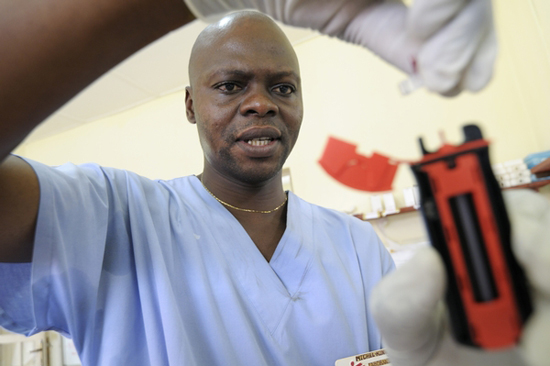The vast majority of people living with the AIDS virus in the Democratic Republic of Congo are deprived of lifesaving treatment.

DRC 2011 © Robin Meldrum
Michel Kongawi, head lab tech, prepares a CD4 test in the laboratory at Lubutu hospital, Maniema Province.
KINSHASA, JANUARY 25, 2012 – The vast majority of people living with the AIDS virus in the Democratic Republic of Congo (DRC) are deprived of lifesaving treatment, due to a withdrawal of international donor support and the lack of national prioritization of the crisis, the international medical humanitarian organization Doctors Without Borders/Médecins Sans Frontières (MSF) said today.
The number of HIV-positive people in DRC is currently estimated at more than one million, 350,000 of whom could benefit from antiretroviral (ARV) treatment. However, only 44,000 people are currently receiving treatment, translating into a 15 percent ARV coverage rate, one of the lowest in the world. Of all African countries, only Somalia and Sudan have similar rates.
The conditions surrounding access to care for people living with HIV/AIDS in DRC are horrific. At the Centre Hospitalier de Kabinda (CHK) in Kinshasa, the capital, MSF has observed an excessively high number of patients arriving with serious complications resulting from lack of treatment. Their advanced illness creates unacceptable suffering.
"I have worked with HIV-positive patients in many countries in central and southern Africa, but what I'm seeing in DRC has not existed elsewhere for years," said Anja De Weggheleire, MSF's medical coordinator in DRC."The situation here reminds me of the time before any antiretroviral (ARV) treatment was available.Our doctors face serious complications every day that could be prevented if patients received early ARV treatment."
The alarming situation for HIV/AIDS patients in the Democratic Republic of Congo (DRC), coincides with the tenth anniversary of the Global Fund to Fight AIDS, Malaria, and Tuberculosis, which is struggling to meet its funding commitments.
The DRC is also one of the two lowest-ranked countries in western and central Africa in terms of prevention of mother-to-child transmission of HIV (PMTCT). Only 1 percent of pregnant women estimated to be HIV-positive in DRC have access to PMTCT treatment. Without treatment, approximately one-third of babies who are exposed to the virus will be born with HIV.
Despite these disastrous indicators, donors have not given DRC the priority it deserves. What is worse, some donors, such as the Global Fund, are withdrawing or sharply reducing their funding. While the Global Fund is the leading supplier of ARV drugs in the DRC, the countries that finance the Fund have not kept their promises. As a result, the Global Fund is having to lower its sights.
This pull-back by donors is directly threatening the lives of thousands of people in DRC.
"If nothing is done, it is highly likely that the 15,000 people currently on the waiting list and in urgent need of ARV drugs will be dead within three years,” said De Weggheleire.“As horrifying as that number is, it represents only the tip of the iceberg when you realize that most people living with HIV/AIDS in DRC do not know their HIV status. Many will die in silence and neglect."
It is crucial that Congolese authorities meet their commitment to provide free prevention services and free treatment for people living with HIV/AIDS. It is also critical that donors immediately mobilize the necessary resources to ensure that patients waiting for ARV treatment are not condemned to die.
MSF has been working in DRC for more than 30 years, operating HIV/AIDS programs since 1996. In October 2003, MSF was the first organization to provide free ARV treatment to patients in DRC. Through its healthcare support programs and its AIDS project in Kinshasa, MSF treats more than 5,000 patients in six provinces, more than 10 percent of the number receiving ARV treatment throughout the country. In Kinshasa, MSF is treating 20 percent of the total number of patients on ARV treatment in the Congolese capital.
Today, MSF is launching a communications and advocacy campaign that will continue throughout 2012 to raise public awareness of the very serious situation facing people with HIV/AIDS in DRC and to encourage all actors to expand ARV coverage.




